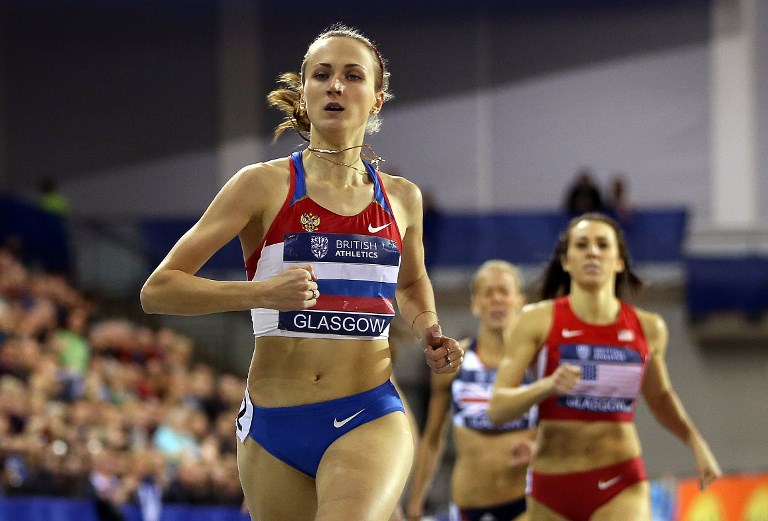
Ekaterina Poistogova of Russia wins the Women’s 800m during The British Athletics Glasgow International Match at The Emirates Arena in Glasgow, Scotland, on January 26, 2013 . AFP PHOTO / IAN MACNICOL / AFP PHOTO / Ian MacNicol
MOSCOW — The International Olympic Committee says it will give medal upgrades to two Russian athletes who have served doping bans.
The IOC will award silver medals to Ekaterina Poistogova and Tatyana Tomashova after other athletes were banned. In the past, the IOC has blocked upgrades in similar cases.
Poistogova was banned for two years in 2017 after a World Anti-Doping Agency investigation found she admitted to using banned substances in undercover footage and discussed techniques to “thwart drug detection.” Tomashova was barred from the 2008 Olympics and banned when a doping sample she submitted was found to contain someone else’s urine.
Both raced at the 2012 Olympics, with Poistogova originally finishing fourth in the 800 meters. Tomashova was fourth in the 1,500.
Two Turkish runners who finished ahead of Tomashova were later disqualified for doping, while Poistogova moved up because her Russian training partner Maria Savinova was banned.
The IOC said it decided to give the medals to the two Russians because their samples from the 2012 Olympics were retested and found to be clean.
“The redistribution of Olympic medals is solely the responsibility of the International Olympic Committee,” track and field’s world governing body, the IAAF, said in an e-mailed statement. “The IAAF does retain the right to decide if it will allow such medals to be presented at an IAAF event.”
Reallocating medals isn’t an automatic process, and the IOC board has previously vetoed some upgrades.
In 2007, when the U.S. sprinter Marion Jones was stripped of her gold medal in the 100 meters from the 2000 Olympics, it wasn’t handed to second-place finisher Ekaterini Thanou of Greece.
Thanou had been embroiled in a scandal at the 2004 Olympics after missing a drug test and allegedly staging a motorcycle crash to create an alibi. She was eventually banned for two years over three missed tests.
The IOC didn’t say why the Russians’ cases were different to that of Thanou. It also didn’t respond to a request for comment on whether more medal reallocations are planned, which could mean more tough decisions over who deserves an upgrade.
Numerous weightlifting results from the 2008 and 2012 Olympics were cast into doubt after retests found steroid use was rife in the sport.
In one event from the 2012 Olympics, the men’s 94-kilogram class, all three medalists and six of the top seven finishers were banned for doping. The original ninth-place finisher, Poland’s Tomasz Zielinski, is in line for an upgrade to bronze even though he was sent home from the next Olympics in 2016 for failing a drug test.